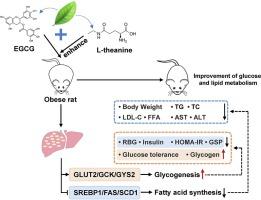L-theanine enhances the improvements of EGCG on glucose and lipid metabolism disorders in obese rats
IF 3.8
2区 农林科学
Q2 FOOD SCIENCE & TECHNOLOGY
引用次数: 0
Abstract
Epigallocatechin gallate (EGCG) and L-theanine (LTA) are two key bioactive components of tea that modulate nutrient metabolism. However, whether the combination of EGCG and LTA will result in synergistic benefits for glucose and lipid metabolism disorders is still unclear. Here, we treated leptin receptor-knockout (Lepr-KO) rats with EGCG and EGCG combined with LTA to examine how combined EGCG and LTA affect glucose and lipid metabolism disorders. Our data suggested that EGCG or EGCG plus LTA all significantly reduced serum triglycerides, total cholesterol, random blood glucose, and increased glucose tolerance, as well as alleviated fatty liver formation in Lepr-KO rats. Moreover, compared with EGCG alone, EGCG plus LTA significantly reduced random blood glucose and plasma triacylglycerols (TG) levels, and alleviated hepatic steatosis. Mechanistic analysis revealed that EGCG plus LTA improved glucose metabolism disorders by activating hepatic glucokinase (GCK) and glycogen synthase 2 (GYS2) expression, and inhibited fatty acid synthase (FAS) and stearoyl-CoA desaturase 1 (SCD1) for lowering hepatic TG accumulation. This study demonstrated that LTA enhances the improvements of EGCG on glucose and lipid metabolism disorders in Lepr-KO rats, especially in glycometabolism.

L -茶氨酸能增强 EGCG 对肥胖大鼠葡萄糖和脂质代谢紊乱的改善作用
表没食子儿茶素没食子酸酯(EGCG)和左旋茶氨酸(LTA)是茶叶中两种关键的生物活性成分,可调节营养代谢。然而,EGCG 和 LTA 的结合是否会对葡萄糖和脂质代谢紊乱产生协同作用仍不清楚。在此,我们用EGCG和EGCG与LTA联合治疗瘦素受体敲除(Lepr-KO)大鼠,以研究EGCG和LTA如何影响葡萄糖和脂质代谢紊乱。我们的数据表明,EGCG或EGCG加LTA均能显著降低Lepr-KO大鼠的血清甘油三酯、总胆固醇和随机血糖,提高糖耐量,并缓解脂肪肝的形成。此外,与单用 EGCG 相比,EGCG 加 LTA 能显著降低随机血糖和血浆三酰甘油(TG)水平,并缓解肝脂肪变性。机理分析表明,EGCG 加 LTA 可激活肝糖激酶(GCK)和糖原合成酶 2(GYS2)的表达,从而改善葡萄糖代谢紊乱,并抑制脂肪酸合成酶(FAS)和硬脂酰-CoA 去饱和酶 1(SCD1)以降低肝脏 TG 的积累。这项研究表明,LTA能增强EGCG对Lepr-KO大鼠葡萄糖和脂质代谢紊乱的改善作用,尤其是在糖代谢方面。
本文章由计算机程序翻译,如有差异,请以英文原文为准。
求助全文
约1分钟内获得全文
求助全文
来源期刊

Journal of Functional Foods
FOOD SCIENCE & TECHNOLOGY-
CiteScore
9.60
自引率
1.80%
发文量
428
审稿时长
76 days
期刊介绍:
Journal of Functional Foods continues with the same aims and scope, editorial team, submission system and rigorous peer review. We give authors the possibility to publish their top-quality papers in a well-established leading journal in the food and nutrition fields. The Journal will keep its rigorous criteria to screen high impact research addressing relevant scientific topics and performed by sound methodologies.
The Journal of Functional Foods aims to bring together the results of fundamental and applied research into healthy foods and biologically active food ingredients.
The Journal is centered in the specific area at the boundaries among food technology, nutrition and health welcoming papers having a good interdisciplinary approach. The Journal will cover the fields of plant bioactives; dietary fibre, probiotics; functional lipids; bioactive peptides; vitamins, minerals and botanicals and other dietary supplements. Nutritional and technological aspects related to the development of functional foods and beverages are of core interest to the journal. Experimental works dealing with food digestion, bioavailability of food bioactives and on the mechanisms by which foods and their components are able to modulate physiological parameters connected with disease prevention are of particular interest as well as those dealing with personalized nutrition and nutritional needs in pathological subjects.
 求助内容:
求助内容: 应助结果提醒方式:
应助结果提醒方式:


